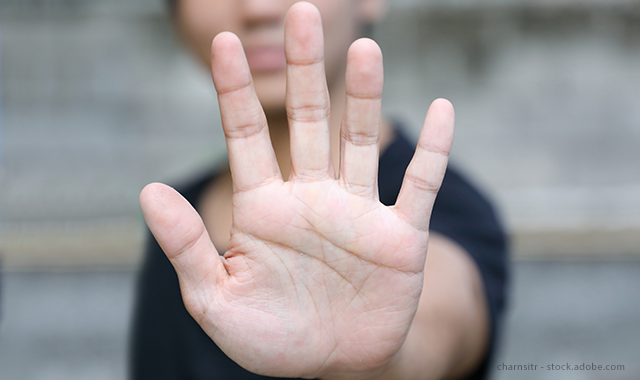Can dentists be the first line of defense against domestic violence?
New research indicates oral biomarkers may help health providers identify victims of abuse.

The University of Arizona College of Medicine - Phoenix and Midwestern University have published an article to bring to light the important role dentists can play in identifying domestic violence victims.
Published April 11 in the Journal of Aggression, Maltreatment and Trauma, the article reports that as much as 75 percent of head and neck trauma associated with domestic violence occurs with oral injury. Researchers concluded that dentists are in a unique position to be the first line of defense in identifying evidence of assault, and then reporting potential cases of domestic violence.
"The overall purpose of the paper is to bring dentistry and its subspecialties into the conversation about traumatic brain injury (TBI), specifically in cases of domestic violence," says Midwestern University dental student Timothy Ellis, lead author of the study. "In our society, and others around the world, domestic violence is more common than many would suspect. Survivors recount 'too many times to remember' that they were abused and blacked out or were struck in the head. Thus, oral and facial trauma may be treated or identified by dentists and dental sub-specialists, opening another avenue for patients to gain access to proper care or needed assistance."
Trending research: Study finds calcium deficiency due to gene mutation leads to damaged tooth enamel
Ellis and Jonathan Lifshitz, Ph.D., director of the Translational Neurotrauma Research Program at the UA College of Medicine - Phoenix, reported an estimated 41.5 million individuals who will experience some type of domestic violence during their lifetime, and 20.75 million will sustain a TBI. Of the victims that sustain a TBI, 8.3 million will live with some form of long-term physiological or psychological consequences of the injury, they said.
"This is a societal need and we have to call on all health care providers and mandatory reporters to join the fight," Dr. Lifshitz says. "This paper is creating additional touchpoints between victims and the health care delivery system. It is an opportunity for dentists to be early detectors who can refer those individuals for follow-up care."
The oral biomarkers that could help dentists potentially identify domestic violence victims include tears, fractures, breaks and chips in the teeth and mouth that would be inconsistent with personal history and, therefore, raise the index of suspicion. Obvious signs of violence that may indicate brain injury include jaw or tooth fractures, trauma to nerves in the mouth and jaw as well as damage to the nasal bone. Tooth discoloration, blunted roots and pulpal necrosis, which is the death of cells and tissues in the center of a tooth, also may be signs of a previous dental trauma warranting further investigation.

According to the publication, dentists receive little to no education about identifying and discussing domestic violence with potential victims, yet they may be the first and only health professional to evaluate a domestic violence victim.
"I have spoken with several dentists regarding the topic," Ellis Lifshitz says. "Many find it interesting; however, they have little experience. The most common answer I receive is that they had just never thought about it or believed that such a case would be more likely to present in a medical facility and, thus, it does not cross their mind when interacting with patients on a daily basis. That said, many dentists are intrigued by the topic and the response has been positive. It is interesting that very stringent protocols exist in pediatric dentistry, but a large gap exists when dealing with teens, young adults and adults in general."
Read more: What is moral injury?
Sheri Brownstein, DMD, director of preclinical faculty at the Midwestern University College of Dental Medicine - Arizona and a co-author of the study, said that as a dentist, she always is sensitive to head and neck injuries and behaviors and how these may be a sign of domestic violence, but she never thought of the oral biomarkers as they relate to traumatic brain injury and domestic violence.
"All dentists should be educated on the identification of potential injuries sustained as a result of domestic violence," she says. "As health care providers, we are already obligated to report suspected abuse. I do not feel that this will add an undue burden to dentists."
Ellis Lifshitz said next steps may include collecting data from dentists to document oral biomarkers of injury. He continues these queries with the objective to help at least one patient and his or her situation.
To read the full study, titled "Restoring More than Smiles in Broken Homes: Dental and Oral Biomarkers of Brain Injury in Domestic Violence," click here.